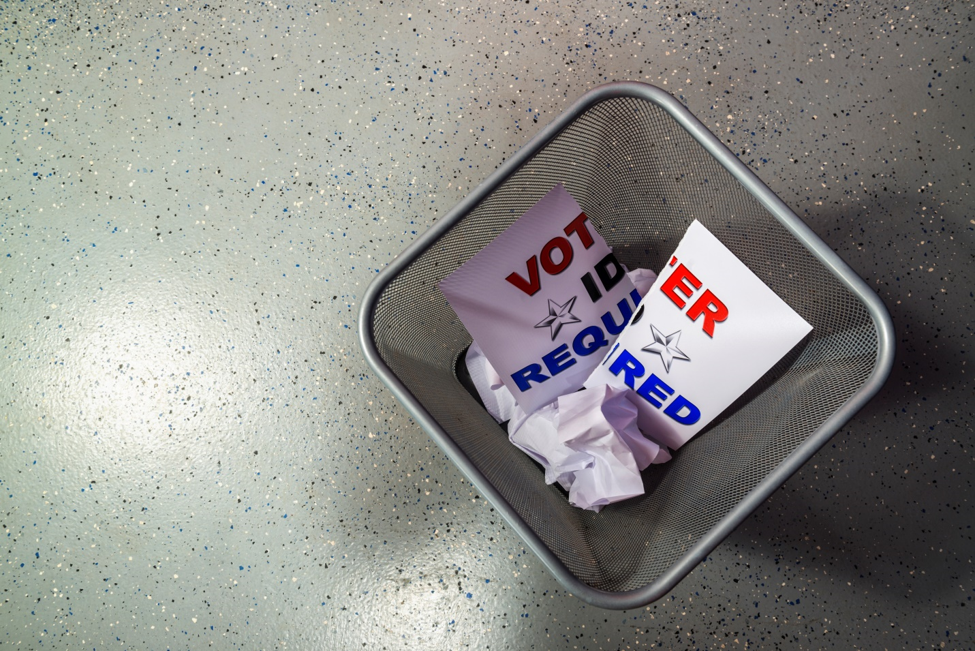
By L.A. Williams
Christian Action League
February 19, 2020
In 2018, North Carolinians went to the ballot box to add a voter ID law to their State Constitution. But as they head to the primary polls March 3, they will not be asked to show identification. And it appears they may once again approach the ballot box in November’s general election without the need for a photo ID.
That scenario became likely on Tuesday when three Democratic judges on the N.C. Court of Appeals issued a preliminary injunction on the voter ID law, accusing legislators who approved the law of racial discrimination. A similar ruling was handed down on Dec. 31, 2019, by U.S. District Court Judge Loretta Biggs, an Obama-appointee.
The Rev. Mark Creech, executive director of the Christian Action League, said the voter ID law is about protecting democracy, not about denying anyone his right to vote.
“I’m sensitive to the many roadblocks to voting that African Americans suffered in this country years ago, but I do not believe this law is some revived effort to deny their right to vote today,” Creech said. “What good is the Voting Rights Act of 1965 if we can’t ensure integrity at the ballot box?”
He said none of the judges seem concerned about the rights of the Tar Heel voters — black, white, or otherwise — who passed the 2018 constitutional amendment by a 10-point margin.
Similarly, North Carolina Republican Party Chairman Michael Whatley said the ruling “invalidated the votes of more than 2 million North Carolinians.”
“The opinion, issued by the North Carolina Court of Appeals, ignores the fact that more than 30 other states have enacted similar laws which have been upheld by federal courts,” Whatley wrote in a press release. “An overwhelming percentage of North Carolinians of every demographic support voter ID, and we are very disappointed to see a panel made up of three Democratic judges overturning their votes by judicial fiat.”
In their ruling, the judges pointed to the fact that the law does not allow the use of public assistance IDs as proof that its writers were racially motivated.
“What isn’t often mentioned is the fact that the law does provide for free state-issued IDs and accepts a wide range of IDs — student IDs, drivers’ licenses, passports, military and veteran IDs, voter and state employee cards, Native American tribal cards, and others,” Creech said. “It seems to me insulting at best, and at worst discriminatory, to imply that people of a certain group are less capable of either coming up with one of these already-approved IDs or taking necessary steps to get a free state ID.”
The law also accommodates religious objectors and allows drivers’ licenses from other states to qualify in some circumstances. Further, supporters point out; it allows that any voter can assert a “reasonable impediment” at the polls for why he or she does not have a qualifying ID and cast a ballot.
House Speaker Tim Moore (R-Cleveland) said in a news release Tuesday that General Assembly leaders will continue to fight on behalf of North Carolina residents “for a common-sense voter ID law that they chose to put in our state constitution.”
“We will not be deterred by judicial attempts to suppress the people’s voice in the democratic process,” Moore said.
Similarly, Sen. Phil Berger (R-Rockingham) posted on social media, “We’ll keep fighting with all we’ve got and will demand to get before the Supreme Court before the November election.”
Thirty-four states require some form of voter ID. North Carolina is the only state in the Southeast not to do so.
According to the Pew Research Center, a 2018 survey showed that more than three-quarters of Americans favored requiring voters to show government-issued photo IDs to vote. The vast majority of Republicans (91 percent) backed ID requirements, as did 63 percent of Democrats.
“I adjure every concerned citizen Christian not simply to curse the darkness of this situation, but to pray about it earnestly. I don’t believe it is an unwarranted concern that this reopens the door to voter fraud, potentially allowing corrupt politicians, or at the least those with awful unchristian worldviews to steal an election,” said Creech. “When injustice and tyranny are pervasive, we must pray, pray, and then pray some more.”
